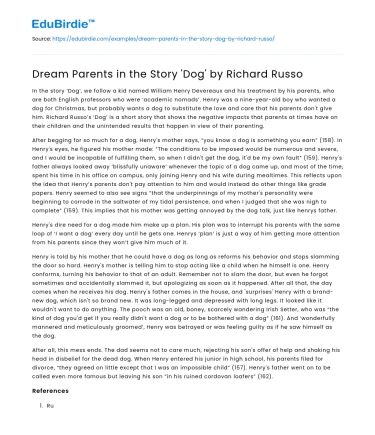In the story ‘Dog’, we follow a kid named William Henry Devereaux and his treatment by his parents, who are both English professors who were ‘academic nomads’. Henry was a nine-year-old boy who wanted a dog for Christmas, but probably wants a dog to substitute the love and care that his parents don't give him. Richard Russo’s ‘Dog’ is a short story that shows the negative impacts that parents at times have on their children and the unintended results that happen in view of their parenting.
After begging for so much for a dog, Henry's mother says, “you know a dog is something you earn” (158). In Henry's eyes, he figured his mother made: “The conditions to be imposed would be numerous and severe, and I would be incapable of fulfilling them, so when I didn't get the dog, it'd be my own fault” (159). Henry's father always looked away ‘blissfully unaware’ whenever the topic of a dog came up, and most of the time, spent his time in his office on campus, only joining Henry and his wife during mealtimes. This reflects upon the idea that Henry’s parents don't pay attention to him and would instead do other things like grade papers. Henry seemed to also see signs “that the underpinnings of my mother's personality were beginning to corrode in the saltwater of my tidal persistence, and when I judged that she was nigh to complete” (159). This implies that his mother was getting annoyed by the dog talk, just like henrys father.
Save your time!
We can take care of your essay
- Proper editing and formatting
- Free revision, title page, and bibliography
- Flexible prices and money-back guarantee
Henry's dire need for a dog made him make up a plan. His plan was to interrupt his parents with the same loop of ‘I want a dog’ every day until he gets one. Henrys ‘plan’ is just a way of him getting more attention from his parents since they won’t give him much of it.
Henry is told by his mother that he could have a dog as long as reforms his behavior and stops slamming the door so hard. Henry's mother is telling him to stop acting like a child when he himself is one. Henry conforms, turning his behavior to that of an adult. Remember not to slam the door, but even he forgot sometimes and accidentally slammed it, but apologizing as soon as it happened. After all that, the day comes when he receives his dog. Henry's father comes in the house, and 'surprises' Henry with a brand-new dog, which isn't so brand new. It was long-legged and depressed with long legs. It looked like it wouldn't want to do anything. The pooch was an old, boney, scarcely wandering Irish Setter, who was “the kind of dog you'd get if you really didn't want a dog or to be bothered with a dog” (161). And ‘wonderfully mannered and meticulously groomed’, Henry was betrayed or was feeling guilty as if he saw himself as the dog.
After all, this mess ends. The dad seems not to care much, rejecting his son's offer of help and shaking his head in disbelief for the dead dog. When Henry entered his junior in high school, his parents filed for divorce, “they agreed on little except that I was an impossible child” (157). Henry's father went on to be called even more famous but leaving his son “in his ruined cordovan loafers” (162).
References
- Russo, Richard. 'Dog'. 1996. Back to the Lake. Ed. Thomas Cooley. 3rd ed. New Yorke Norton, 2015. 157-62. Print.






 Stuck on your essay?
Stuck on your essay?

